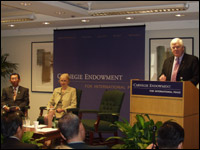Registration
You will receive an email confirming your registration.
IMGXYZ750IMGZYXOn July 17th the Carnegie Endowment for International Peace hosted a discussion on trade preferences for least developed countries (LDCs) with H.E. Cham Prasidh, Senior Minister and Minister of Commerce of the Kingdom of Cambodia, and Congressman Jim McDermott. Carnegie’s Sandra Polaski moderated the discussion.
The coming year will see the expiration of both the Generalized System of Preferences (GSP) and of safeguards that constrain Chinese exports to the U.S. Both developments will make it even harder for exporters in LDCs such as Cambodia to increase their exports to the U.S. There is currently a provision on the table in the Doha Round of trade negotiations at the World Trade Organization (WTO) that would grant duty-free quota-free (DFQF) treatment to all LDC exports, but given the recent breakdown in negotiations, it could be years before the Round is completed.
What can the U.S. do to help create growth opportunities for LDCs in this context? Minister Prasidh urged the U.S. to unilaterally grant DFQF treatment to exports from all LDCs. He argued that for Cambodia to sustain its recent success in reducing poverty, it needs new growth opportunities, such as those that DFQF access to the U.S. market would create. New preferences would erode the margins enjoyed by current LDC beneficiaries of U.S. preference programs, such as sub-Saharan African countries, but Minister Prasidh stressed that granting a consistent set of preferences to all LDCs would be both equitable and logical.
Congressman McDermott pointed out that reducing poverty abroad serves U.S. interests not only by combating injustice and increasing the legitimacy of multilateral institutions, but also by creating commercial opportunities for the U.S. Unfortunately, the U.S. has done an inadequate job of listening to the losers from trade, according to the Congressman. Since 1954 the LDC group of countries’ share of world trade has fallen from 3% to .7%. Flaws in trade preference programs have played a role in this distressing trend. In Congressman McDermott’s opinion, more products should be covered under the GSP and the thresholds for “graduating” countries and products from GSP treatment should be set higher. New legislation being prepared by the Congressman’s office will seek to establish a uniform set of preferences covering all products originating in all LDCs that meet criteria relating to labor standards and the rule of law.
Congressman McDermott suggested that extensive consultations with countries such as China and India are necessary to identify opportunities for China and India to promote (and benefit from) growth in LDCs. Minister Prasidh pointed out that if 1% of U.S. imports from China were instead sourced from LDCs, annual LDC exports would double.
Moderator Sandra Polaski asked both speakers to consider incorporating positive incentives for improved labor standards into the new preference legislation. Both speakers agreed that the U.S. – Cambodia Textile Agreement provides a useful model. The agreement, which linked improvements in Cambodian working conditions to higher export quotas into the U.S. market, has led to unprecedented improvement in working conditions in Cambodia, including widespread unionization by workers there.
